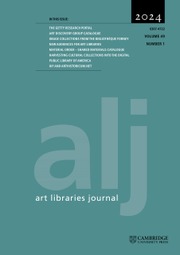The Art Libraries Society of the UK & Ireland recently concluded the first annual conference to be held in person since the beginning of the pandemic. The conference reflected on neutrality within libraries, asking: ‘If the creation and distribution of knowledge is not neutral, where does it leave us?’1
I wish I could convey more detail about the speakers and the presentations and how each reflected on this extremely pertinent topic, but I'm writing this in May, and the conference hasn't occurred yet. As you are reading this in July, however, I'm sure it was a remarkable return to the in-person conference after being relegated to the virtual world by Covid for two years. Personally, it will have been the first professional conference I've attended since the 2019 ARLIS UK/Ireland conference in Glasgow.
Although I'm sure we all were excited to meet in Bristol and discuss our profession without having to log into Zoom, there are several aspects of how we were forced to interact over the past two years that may be worth examining - some of which may be reflective of this year's conference theme. Although the Covid years certainly removed some personality from the conference, they did provide an unprecedented level of access. Like it or not, in-person conference attendance is largely something available only to the most privileged with in a profession or field. The ideas shared and concepts discussed at conferences are generally only available to those that can afford the travel, lodging and registration fees.
The Covid years leveled that playing field. Because we were all forced to meet virtually, the barriers that inhibit conference attendance were lowered, and people who were previously unable to attend for any variety of reasons were suddenly able to take part in professional discourse and discussions. For some organizations, the attendance for virtual conferences far exceeded what could be expected in an in-person event.2
Now it seems most organizations have returned to fully in-person events. There are many financial and logistical reasons for this, but after two years of virtual events, it doesn't really feel like a return to normality. It feels like a paradigm has shifted and people have different expectations post Covid.
I'm not criticizing any of this year's conferences, and I'm not arguing that we go back to virtual conferences in the future. I understand how complicated planning such an event can be, and I love being able to meet and interact with my colleagues in person. I just hope that all organizations and institutions will remember how they were able to provide access to their membership when it was necessary and that they work to make the academic and professional conference a less privileged event in a post-covid world.
Although I'm sure the content of this year's conference will be disseminated and discussed within Art libraries journal in the upcoming months, this issue includes a paper by Dr. Griselda Pollock that examines themes adjacent to that of the conference. In ‘Reading the library: institution, archive and the future of a field,’ originally a keynote address at the 2021 ARLIS UK & Ireland virtual conference, Dr. Pollock discusses the structures and politics of knowledge within the library. In the paper, Dr. Pollock calls for an examination of ‘…the institution itself, its systems, and the way the library speaks power and cultural structures that exclude, dislocate, dissipate, and thus deny the contesting voices while also being a potential site of their collection and preservation.’
This issue also includes an interview with Annelys Devet, the co-founder of Disarming Design from Palestine, a non-profit organization that uses design to raise awareness and contribute to social justice surrounding the Palestinian cause. The organization operated a ‘relational library’ at a facility in Birzeit until it was forced to close due to Covid. However, the library and organization continue the work digitally.
Finally, this issue includes an article on managing collection development colorations at large, multi-branch institutions. In ‘Art library collections at research universities: Challenges and opportunities for collaborative collection development,’ Giana Ricci, Librarian for the Fine Arts, and Lori Salmon, Head of the Institute of Fine Arts Library discuss their experience navigating the challenges of collection development collaboration at New York University. They also discuss how they reframed those challenges as opportunities and discuss the benefits of the collaboration.
1. “ARLIS Bristol 2022,” Arlisbristol2022, accessed May 10, 2022, https://www.arlisconference2022.com.
2. Kate Hidalgo Bellows, “The Academic Conference Will Never Be the Same,” The Chronicle of Higher Education, February 11, 2022, https://www.chronicle.com/article/the-academic-conference-will-never-be-the-same.


